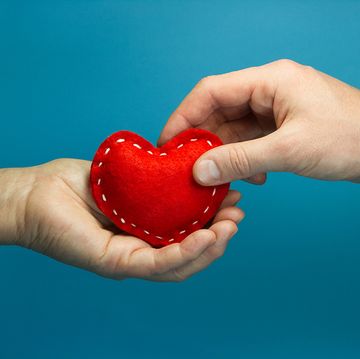Think "satisfied," not "giddy". "I tell my friends that happiness is like dessert. If you expect every meal to be dessert, you're going to be disappointed. Doctors call being happy all the time 'mania'—it's just not normal. Normal for most people is to be happy about 15 percent of the time, to be unhappy 15 percent of the time, and to be mood-neutral—that is, satisfied with your life—70 percent of the time. Women today think they can only be happy if everything is right: They're in a great relationship, healthy, thin, financially secure, the house looks perfect, they're successful, the kids are doing great in school. But how often is everything like that at once? Write down the 10 or 12 factors you count on to feel happy, then be content if just the four most important ones are clicking at the same time." —Alice Domar, Ph.D., executive director of the Domar Center for Mind/Body Health in Waltham, MA, and author of Be Happy Without Being Perfect and Healing Mind, Healthy Woman
Sometimes emojis aren't enough. "When you're upset, venting online should be a last resort. Getting support is a completely different experience in person. Recently, during one of our usual walks, a friend told me she was going through a very stressful time because her teenage daughter refused to acknowledge my friend's not-so-new and very serious boyfriend. I put my arm around her, looked her in the eye, and encouraged her to keep talking: 'Then what happened?' 'How was that for you?' What she needed most was for me to simply listen, see her pain, and acknowledge how upsetting the experience was for her. When you're communicating digitally, you can't read that person's body language or hear their tone of voice. And that's unfortunate, since studies show that human touch, eye contact, and facial expressions can lower blood pressure, heart rate, anxiety, and sadness, as well as decrease physical pain. So when you need to talk, your first choice should be to do it in person. If that's not an option, get on the phone or video chat." —Margaret Howard, Ph.D., director of women's behavioral health at Women and Infants Hospital of Rhode Island
You might have to talk yourself into it. "Being happy is a choice. I have a friend who tends to be really negative—she fixates on upsetting situations and gets frustrated and emotional. She needed to recognize her worth and stop giving her power away to people who were making her unhappy. So I told her to look in the mirror every morning, take a few deep breaths, and recite these affirmations: 'I am confident, and it's a wonderful day. I am the architect of my life, and I have talents I will use today.' It sounds kind of hokey, but research shows that affirmations can reduce stress hormones in the body and help create lasting change. My friend tried this, and her upsetting daily drama really did decrease." —Aunna Pourang, M.D., a holistic family physician in Los Angeles and author of Meditate, Don't Medicate
Order the salmon. "Recently, a close friend of mine took on a new role at work. She was excited, but it was difficult to juggle that with her life at home, and she was getting increasingly stressed and anxious. Plus, she was beginning perimenopause, which can start in your late 30s. When hormone levels aren't flowing properly, all those important neurotransmitters in the brain that keep us calm, focused, and upbeat plummet. My prescription: Eat more fish! The omega-3 fatty acids found in fish, especially salmon, regulate serotonin levels. Research even shows that women who have a low intake of omega-3s have a greater risk of depression. So make sure to get two to three servings of fish a week. Vegetable oils are another good source. If you can't get enough of either, talk to your doctor about taking a supplement. After a month of eating more omega-3s, my friend felt a noticeable difference." —Pamela Peeke, M.D., author of Body for Life for Women and senior science advisor to Elements Behavioral Health treatment centers
Leave the dishes! "My number-one rule is to get enough sleep. I have so many friends who will say, 'Oh, I was up until 2 a.m.' because they were baking for the school sale or finishing a work report. One woman I know was a wreck because she felt she had to be constantly responsive to her 3-year-old, nurse her baby, keep her home pristine, and put every meal on the table herself. She was so exhausted that she was in tears! Sleep is a critical biological requirement, and getting too little affects your mood and increases your feelings of unhappiness. When you're overtired, not only are your energy and productivity likely to plummet, but you can become irritable and impatient, and ultimately you might feel guilty about your behavior. It's often true that when you shortchange yourself on sleep, you shortchange others in your life too, and because women are often socialized to feel responsible for everyone else, it creates this vicious cycle. My friend's remedy was simple: I talked her into setting a reasonable bedtime for herself and sticking to it no matter what else she had on her plate, and in a week she felt better and had more energy." —Jephtha Tausig-Edwards, Ph.D., a clinical psychologist in New York City and supervising psychologist for Family & Children's Services of Nantucket
Don't give in to your hormones. "You know that the hormonal swings you experience leading up to your period have a very pronounced effect on your happiness. They cause bloating and water weight gain, which starts the madness. You step on the scale, struggle to get your jeans buttoned, or just feel bigger and it immediately puts you in a bad mood. The key is to get control of the physical symptoms before they start. I tell my friends to adapt their diets from the time they ovulate, around day 13 or 14, to when their periods actually start, at day 28. Load up on natural diuretics like asparagus, tomatoes, watermelons, cucumbers, cranberry juice, garlic, and green tea. At the same time, increase your protein and water intake and cut back on salty foods, sugar, alcohol, and caffeine. Salt causes your body to retain water, while the others are inflammatory and can worsen PMS symptoms. And try to get some exercise, which releases feel-good endorphins." —Sheryl Ross, M.D., a board-certified ob/gyn in Santa Monica, CA
Stop focusing on yourself. "I had a close friend who was going through a really tough time economically and couldn't find a good job. I suggested she find a place to volunteer where she could use her professional skills and focus on something positive. Volunteering is terrific for mental health: Research shows it can reduce depression and increase life satisfaction. It's easy to get caught up in the size of our house or the car we drive, and volunteering balances all that out—it makes us grateful for what we have, which is so important. And in my friend's case, it really turned out well. She loved the volunteer work, her skills were valued, and she ended up being offered a perfect job with benefits at that very charity." —Tausig-Edwards













